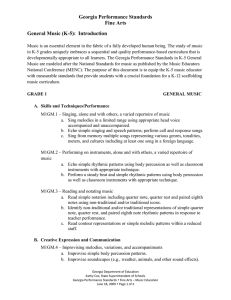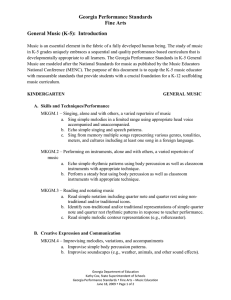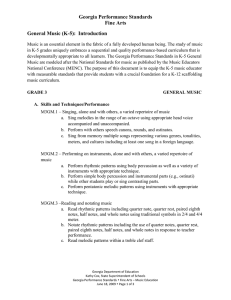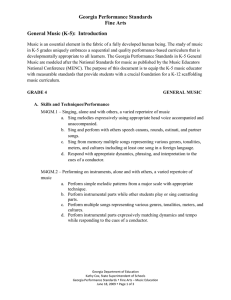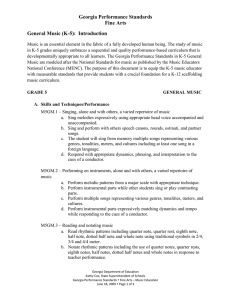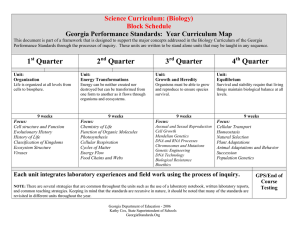Georgia Performance Standards Fine Arts General Music (K-5): Introduction
advertisement
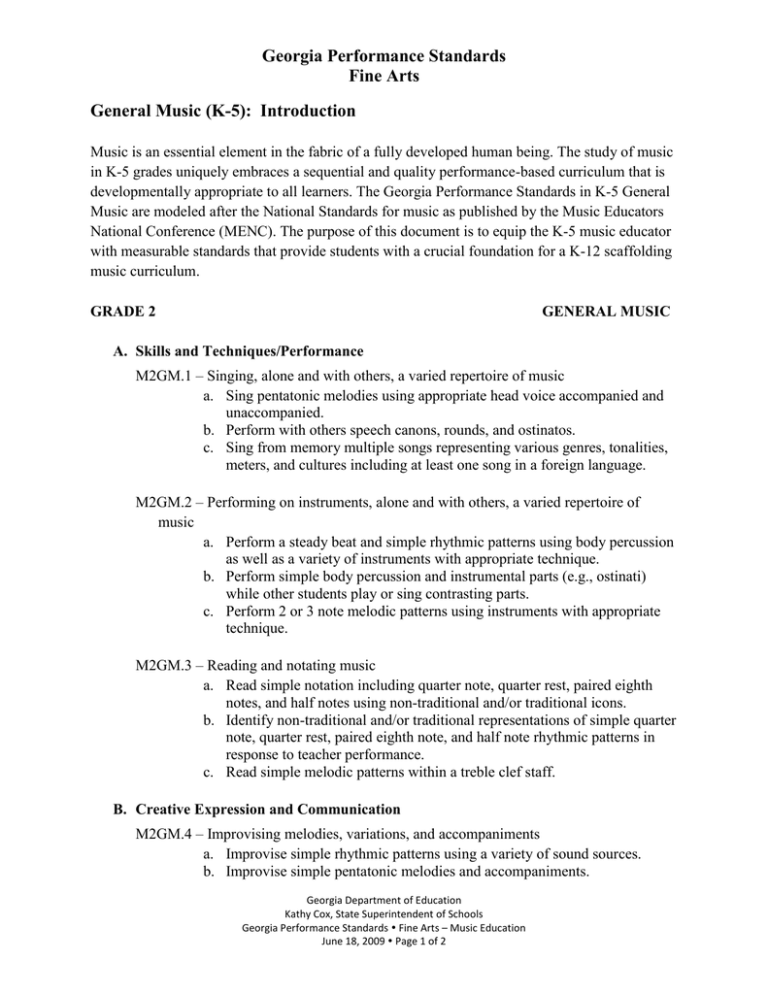
Georgia Performance Standards Fine Arts General Music (K-5): Introduction Music is an essential element in the fabric of a fully developed human being. The study of music in K-5 grades uniquely embraces a sequential and quality performance-based curriculum that is developmentally appropriate to all learners. The Georgia Performance Standards in K-5 General Music are modeled after the National Standards for music as published by the Music Educators National Conference (MENC). The purpose of this document is to equip the K-5 music educator with measurable standards that provide students with a crucial foundation for a K-12 scaffolding music curriculum. GRADE 2 GENERAL MUSIC A. Skills and Techniques/Performance M2GM.1 – Singing, alone and with others, a varied repertoire of music a. Sing pentatonic melodies using appropriate head voice accompanied and unaccompanied. b. Perform with others speech canons, rounds, and ostinatos. c. Sing from memory multiple songs representing various genres, tonalities, meters, and cultures including at least one song in a foreign language. M2GM.2 – Performing on instruments, alone and with others, a varied repertoire of music a. Perform a steady beat and simple rhythmic patterns using body percussion as well as a variety of instruments with appropriate technique. b. Perform simple body percussion and instrumental parts (e.g., ostinati) while other students play or sing contrasting parts. c. Perform 2 or 3 note melodic patterns using instruments with appropriate technique. M2GM.3 – Reading and notating music a. Read simple notation including quarter note, quarter rest, paired eighth notes, and half notes using non-traditional and/or traditional icons. b. Identify non-traditional and/or traditional representations of simple quarter note, quarter rest, paired eighth note, and half note rhythmic patterns in response to teacher performance. c. Read simple melodic patterns within a treble clef staff. B. Creative Expression and Communication M2GM.4 – Improvising melodies, variations, and accompaniments a. Improvise simple rhythmic patterns using a variety of sound sources. b. Improvise simple pentatonic melodies and accompaniments. Georgia Department of Education Kathy Cox, State Superintendent of Schools Georgia Performance Standards Fine Arts – Music Education June 18, 2009 Page 1 of 2 Georgia Performance Standards Fine Arts M2GM.5 – Composing and arranging music within specified guidelines a. Create sound effects to accompany songs, poems and stories. b. Compose rhythmic patterns including quarter notes, quarter rests, paired eighth notes, and half notes using traditional music notation. c. Arrange rhythmic patterns creating simple forms and instrumentation. C. Critical Analysis/Investigate M2GM.6 – Listening to, analyzing, and describing music a. Distinguish between repeating and contrasting sections, phrases, and simple formal structures – AB, ABA. b. Describe music using appropriate vocabulary (allegro, adagio, forte, piano, upward, downward), appropriate mood, and timbre adjectives. c. Identify classroom and various orchestral instruments by sight and sound. d. Aurally distinguish between solo vs. ensemble, and accompanied vs. unaccompanied singing. M2GM.7 – Evaluating music and music performances a. Evaluate musical performances of themselves and others. b. Explain personal preferences for specific musical works using appropriate vocabulary. D. Cultural and Historical Context M2GM.8 – Understanding relationships between music, the other arts, and disciplines outside the arts a. Describe the relationship between music and the other arts. b. Describe the relationship between music and disciplines outside the arts. M2GM.9 – Understanding music in relation to history and culture a. Sing, listen, and/or move to music from various historical periods and cultures (e.g., famous Georgia musicians). b. Describe how sounds and music are used in daily lives. c. Demonstrate appropriate audience behavior for the context and style of music performed. M2GM.10 – Moving, alone and with others, to a varied repertoire of music a. Respond to contrasts and events in music with gross and fine locomotor and non-locomotor movements. b. Perform choreographed and non-choreographed movements. c. Perform line and circle dances. Georgia Department of Education Kathy Cox, State Superintendent of Schools Georgia Performance Standards Fine Arts – Music Education June 18, 2009 Page 2 of 2
